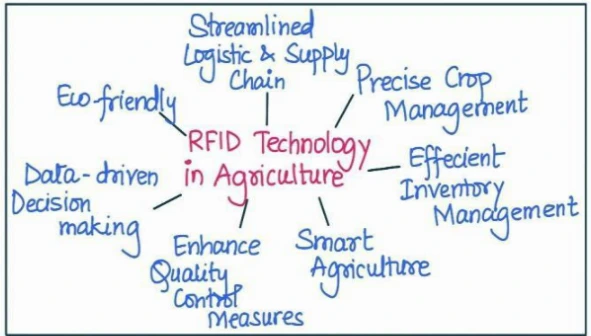Answer:
|
How to approach the question
- Introduction
- Write briefly about the RFID technology.
- Body
- Mention the impact of RFID in farming and supply change management. Give a few examples.
- Conclusion
- Give an appropriate conclusion in this regard
|
Introduction
Radio Frequency Identification (RFID) is a technology that uses radio waves to identify and track objects or individuals wirelessly. It consists of two main components:
- RFID tag: a small electronic device that contains a unique identifier and other data.
- RFID reader: is a device that emits radio waves and detects the signals from RFID tags within its range
RFID technology uses radio waves to passively identify a tagged object. It is used in several commercial and industrial applications, from tracking items along a supply chain to keeping track of items checked out of a warehouse.
Body
Impact of RFID in Farming and Supply Change Management

Radio Frequency Identification technology has emerged as a valuable tool in the agriculture sector, offering numerous advantages to farmers and the industry as a whole. It is especially utilized in farming and supply chain management for:
- Precise Crop Management and Livestock Management: RFID provides real-time data on growth, and environmental conditions, and enables precise resource management.
Further, RFID tags attached to livestock enable farmers to track individual animals, monitor their health, disease control and manage breeding programs effectively. For example, farmers can use RFID to track the health and location of each cow in a large herd, ensuring timely interventions and optimized breeding programs. Example- RFID sensors placed in a greenhouse farm monitor temperature and humidity levels.
- Efficient Inventory Management: enables farmers to accurately track and manage their inventory (agricultural products, equipment, and supplies) along with real-time visibility of inventory levels and reduced manual labour. Example- A dairy farm uses RFID tags on individual cows to monitor their health, feeding patterns, and milk production.
- Streamlined Logistics and Supply Chain Operations: RFID technology enables real-time tracking and monitoring of agricultural products, optimizing supply chain operations and minimising losses, and logistics management, resulting in improved customer satisfaction. Example- An organic produce distributor uses RFID tags on crates of fruits and vegetables. As the products move from farms to distribution centers and finally to stores, RFID readers capture their movements,
- Enhanced Traceability and Quality Control: it facilitates traceability throughout the agricultural supply chain by tagging products with RFID tags, farmers and suppliers can track the movement and origin of products, ensuring transparency and improving quality control measures. This contributes to food safety and regulatory compliance. Example- A fruit exporter uses RFID tags on each box of fruit. If a batch is found to be contaminated, the source of the contamination can be quickly identified
- Data-Driven Decision Making: RFID generates a wealth of data that can be analyzed to gain insights and make informed decisions. Farmers can use this data to optimize planting schedules, adjust irrigation and fertilization, and implement precision agriculture practices. It leads to increased productivity, reduced costs, and improved resource efficiency.
- Sustainability and Environmental Benefits: RFID technology contributes to sustainable agricultural practices by reducing waste, optimizing resource utilization, and minimizing the environmental footprint of the supply chain. For example, efficient inventory management and streamlined operations reduce unnecessary waste and improve sustainability.
Conclusion
Thus, RFID technology in agriculture and other sectors is poised to bring about remarkable transformations. Overall, the future of RFID technology in this sector holds tremendous potential for enhancing efficiency, accuracy, and sustainability.
To get PDF version, Please click on "Print PDF" button.


https://uploads.disquscdn.com/images/416252bf6834037d6228d1dbba4c05c0cc6826eb25feb9c28ab55fa4809914cb.jpg https://uploads.disquscdn.com/images/5c0ff0d31e18b758730e1b837960b8d1305378837e3672c26e2ada3716c0ca4c.jpg
https://uploads.disquscdn.com/images/f7cbf080e778c9ccc76e81dd228f89e3653a4a7e26eb9cb62ff55656640d4789.jpg https://uploads.disquscdn.com/images/c7d2b4a694860d3f0756b2d745d3d14b33a3d814eea6331bea1cd70c47fa8336.jpg